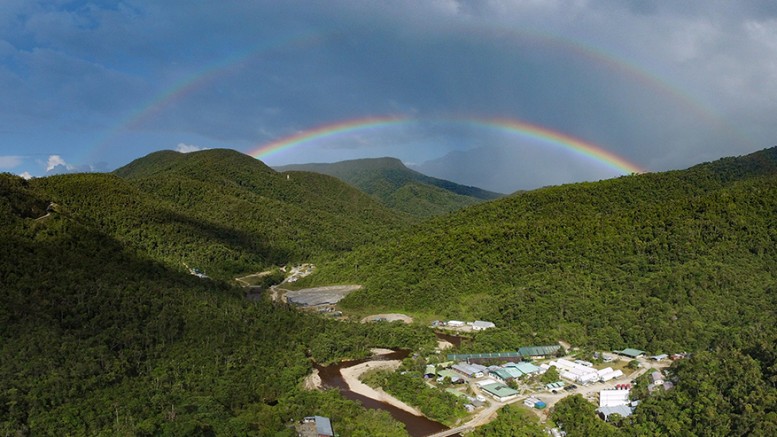VANCOUVER — Lundin Gold (TSX: LUG; US-OTC: FTMNF) has completed a feasibility study that outlines a path to production at its flagship Fruta del Norte (FDN) gold project in southeastern Ecuador. The company hopes to secure its environmental licence and water permits by the fourth quarter, which would set the stage for project financing in mid-2017. The first year of commercial production is scheduled for 2021.
The study, released on June 6, is the second milestone for Lundin this year. In late January the company negotiated an agreement with the Ecuadorian government that outlines a financial and tax regime for FDN’s development.

Fruta del Norte project location map. Credit: Lundin Gold.

The Las Peñas camp in Ecuador. Credit: Lundin Gold.
The study was prepared by lead engineering firm Amec Foster Wheeler, and supported by Klohn Crippen Berger. The operation would produce 340,000 oz. gold annually over a 13-year mine life at all-in sustaining costs of US$623 per oz. gold.
Lundin models capital expenses of US$669 million, which doesn’t include US$430 million in sunk costs that will have been incurred at FDN before an expected official construction date in early July 2017.
Twin declines would be built 155 metres below the Machinaza River, while the mine ramp would be located central to the main workings east of the deposit. The plan is based on probable reserves of 15.5 million tonnes of 9.67 grams gold per tonne and 12.7 grams silver per tonne for 4.8 million contained oz. gold and 6.34 million contained oz. silver.

The Fruta del Norte orebody is 1,670 metres along strike by 700 metres down dip, and ranges in width from 150 metres to 300 metres. Credit: Lundin Gold.
“This [study] provides a solid basis for FDN to advance immediately into development and become a landmark and profitable mining operation,” president and CEO Ron Hochstein said during a conference call. “This is the type of deposit that companies are built on, and it will be a new economic driver for Ecuador. Our focus now shifts to environmental permitting and further optimization in preparation for the start of portal construction and operations.”
Ore would be processed using a gravity, flotation and leaching flow sheet. The gravity circuit would recover the coarse free gold, and small amounts of fine free gold, while the flotation circuit would recover gold associated with sulphides. Flotation tailings would be treated in a carbon-in-leach to recover the fine-grained gold.
Over the mine’s life, 70% of the gold would be produced in concentrate and the rest in doré. The silver production would be 82% in concentrate and 18% in doré.
At a US$1,250 per oz. gold price , the project would have a US$676-million after-tax net present value (NPV) at a 5% discount rate, and a 15.7% internal rate of return (IRR). Pre-tax numbers feature a US$1.3-billion NPV and a 23.8% IRR.
Basic engineering and early site work would start in the third quarter, with an exploitation agreement and US$25 million in advance royalty payments following early next year. Lundin would begin earthworks in late 2017 and process plant construction in early 2018.

Meeting in Ecuador to discuss the Fruta del Norte project (from left): Ron Hochstein, CEO of Lundin Gold; Rafael Poveda, co-ordinating Minister of Strategic Sectors; Marianick Tremblay, Canadian Ambassador to Ecuador; Jorge Glas, Vice-President of Ecuador; Lukas Lundin, chairman of Lundin Gold; and Javier Córdova, Ecuador’s Minister of Mining. Credit: Lundin Gold.
“We’ve come a long way in Ecuador over the past 18 months,” chairman Lukas Lundin said. “When we started the journey, we were worried about permits and different tax regimes. Now I think we have it all in place, and have full cooperation from the government to get the project going. The study demonstrates a long-life mine and we have great exploration potential, so I see us being there for a long time.”
Hochstein explained that the company will be looking at a “two-stage” financing, with the first component scheduled to close by the third quarter. Lundin expects to spend US$120 million at FDN to reach construction in mid-2017. The company would then complete a larger financing to fund the feasibility study’s development capital.
“We believe we’ll be able to minimize dilution and lower our cost of capital by de-risking the project over the next year, improving the economics. The two-stage financial strategy will also get us through the election in Ecuador in February,” Hochstein added.
Lundin has carried out a regional drill campaign 15 km to 20 km south of FDN that includes the Robles, Chanchito and Emperador targets, comprising 20 holes totalling 7,500 metres. The company may follow up with another 3,000 metres.
Lundin has traded within a 52-week range of $3.46 to $6.51 per share, and dropped 6.5%, or 40¢ on the feasibility study news, en route to a $5.84 per share close at press time. The company has 101.3 million shares outstanding for a $632-million market capitalization, and at the end of March reported US$7.8 million in cash.
On June 27, Lundin lined up a bought deal financing of 15 million shares priced at $5.50 per share, for gross proceeds of $82.5 million. If a 15% over-allotment option is exercised under the same terms, the money raised would rise to $94.9 million.


Be the first to comment on "Lundin Gold tables feasibility study for Fruta del Norte"